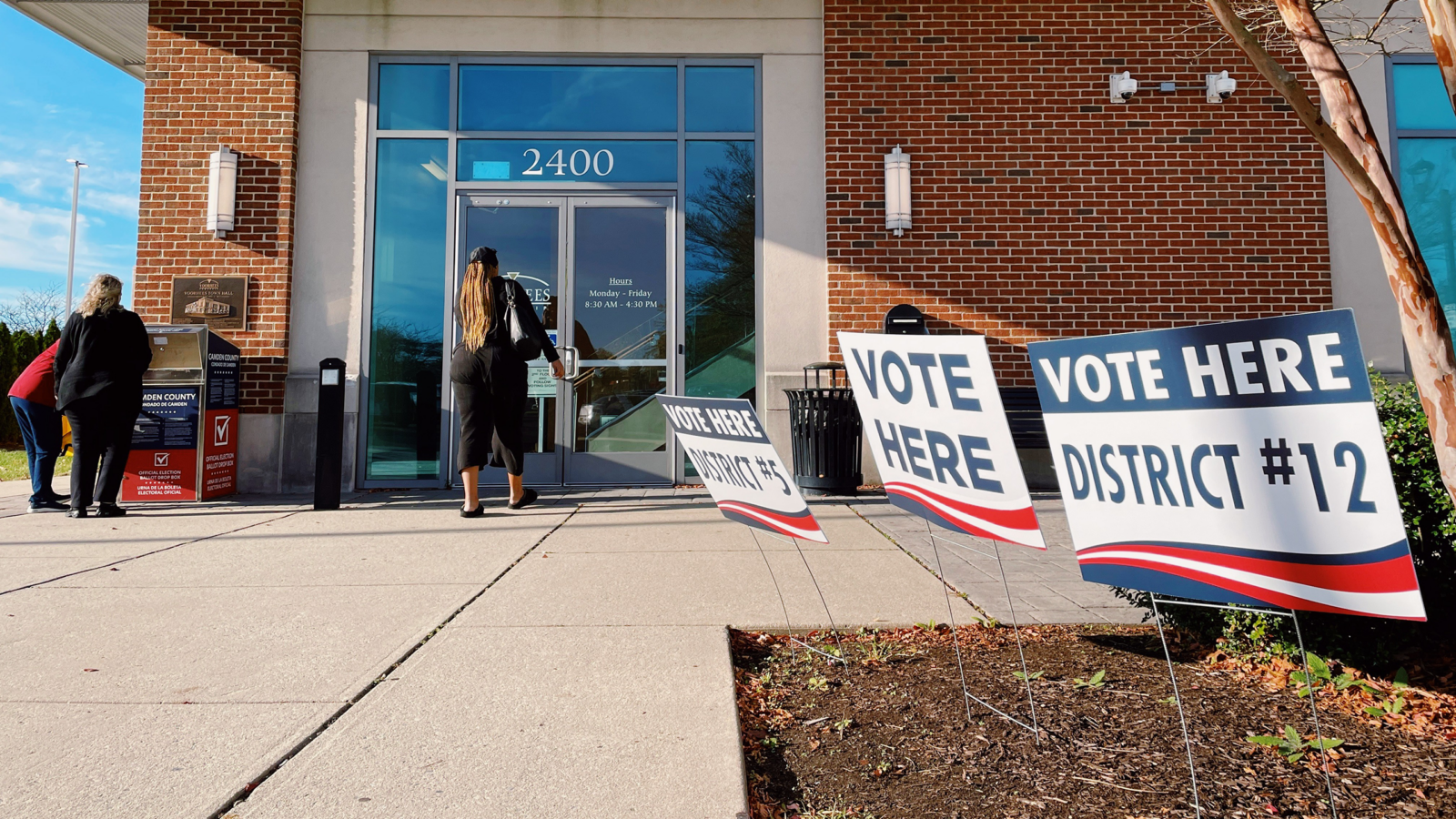Good morning and happy Election Day. Don’t forget to vote.
Corporate boards are also increasingly casting about for new leadership, choosing to oust CEOs who can’t keep up the pace. According to a new report by The Conference Board, 42% of S&P 500 firms that have replaced their CEO this year had stock returns in the bottom quarter of their industry. That’s up from 2017, when just 30% of companies that made a leadership change posted stock returns in the lowest quartile. It’s not exactly democracy at work, but CEOs who don’t deliver are being held accountable for their actions in office.
Election Day is a Major Distraction. The Economy Will Feel the Hit.

Can’t stay off your social media feeds or tune out cable news? You’re not just potentially harming your own mental health — you’re hurting the economy, too.
In fact, distractions from Election Day mania — including, of course, time spent away from work to cast a ballot — are expected to be so extreme, they may cost the American economy billions of dollars per hour this year. In other words, this election is creating winners and losers before we even know the results.
One-Two Punch
Unlike most developed democracies, the US holds its national elections on a workday. That means the journey of voting, doomscrolling, and then suffering/overcoming anxiety attacks all happens on company time. Twenty-eight different states require that employers give employees time to vote; a recent survey of human resources professionals from executive coaching firm Challenger, Gray & Christmas found that 60% of companies already allow workers to take time to vote with no penalty. In Detroit, United Auto Workers and the Big Three car manufacturers that employ them agreed in their latest contract to make Election Day a holiday. In short: Civic responsibility comes with the trade-off of economic drain.
On the flip side, the election is fraying the nerves of the electorate, with nearly 70% of US adults calling it a significant source of stress, according to a recent report by the American Psychological Association. The state of high political anxiety has at least briefly resulted in low spending among consumers:
- According to a recent Ipsos poll of roughly 1,000 US adults, 47% said election stress is causing them to spend less and save more (the other 53% presumably factored Election Day binge-eating into their counter-response). From Marriott to Target, consumer-facing businesses have spent this past earnings season warning of an election week slowdown.
- Meanwhile, the scale of an Election Day productivity slowdown could be staggering. An analysis by Challenger, Gray & Christmas estimates that productivity losses could reach $3.5 billion per hour (the firm previously estimated that distracted sports fans drained the economy of $2.1 billion through March Madness this year).
All Eyes on Them: The political unease has been a boon for some but not all in medialand. In an earnings call Monday, Fox Corp. credited a surge in political campaign advertising for helping push its revenue beyond Wall Street’s expectations and boost its profits — $832 million in the quarter — to double what they were a year ago. Meanwhile, BIA Advisory Services estimates an eye-watering $11.7 billion will be spent on local political advertising, a massive windfall for local TV stations. Doing less well: The New York Times, which reported a slowdown in digital subscriber growth in its earnings report Monday, sparking a 7% share price skid. Tomorrow’s Wordle: GLOOM.
The Smart Home Tech Investment Ready to Take Off
Missed out on RING before it sold to Amazon for over $1 billion? RYSE is your next big chance.
Unlike RING, which got turned down on Shark Tank, RYSE hit Canada’s Dragon’s Den and received two offers – showing they’re positioned to explode.
With $9 million in revenue, 60,000 units sold, and a new retail rollout in over 120 Best Buy stores, RYSE is ready to capture its share of the booming $158 billion Smart Home market, projected to grow 23% annually.
Be part of this incredible journey alongside early believers.
Invest in RYSE now at $1.75/share before they become a household name.
Big Tech’s Energy Rush Hits a Hurdle
Last week the Federal Energy Regulatory Commission kiboshed a bid to increase the amount of power that a nuclear plant in Pennsylvania is allowed to supply to one of Amazon’s data centers.
The fallout from FERC’s decision was felt on Monday, as producer share prices tumbled and Big Tech was left to ponder where on earth it will find the energy it needs to fuel its AI ambitions.
Speedrunning Energy Infrastructure
Building and running generative AI tools takes an extraordinary amount of power — enough to upend the modern electricity market — so Big Tech companies have been flocking toward the energy industry looking for ways to shore up future capacity and stay in the genAI arms race. Microsoft and OpenAI already had a penchant for nuclear power (Bill Gates and Sam Altman are both backers of nuclear power startups), and in recent months Amazon and Google have joined the uranium-laced party.
Big Tech has been trying its hardest to cut out the middleman and strike deals to spin up energy projects, but the energy industry — and nuclear energy in particular — is not built for companies that like to move fast and break things. The wider drive toward deals like Amazon’s appears to be on FERC Commissioner Mark Christie’s mind, as he wrote in the decision: “Were we to approve this proposal at this time […] we would be setting a precedent that would be used to justify identical or similar arrangements in future cases.” The FERC decision put a slight damper on the nuclear stock rally this year:
- Power producer Talen Energy, which sold Amazon the data center campus that would be powered by the nuclear plant, took a roughly 10% hit to its share price following the news on Friday, which fell another 2% on Monday.
- The contagion spread across the nuclear industry on Monday: The share price of Constellation Energy, which is seeking similar deals to Talen and has been one of the best-performing stocks on the Nasdaq this year, plummeted nearly 13%.
Still, not everyone is convinced that the nuclear boom is over. “I think it’s more than a hiccup,” Evan Caron, co-founder and CIO of climate-tech incubator Montauk Climate, told The Daily Upside. “I think it shows that the regulators are really thinking about how to balance significant additional load growth with the needs of the community and focusing on ratepayers, a balanced approach to growth, and making the big data center operators pay for their fair share.”
Industry Buzz: As stinging as the FERC setback may have been, it isn’t the only thing restricting Big Tech’s nuclear dreams. The Financial Times reported on Monday that Meta had plans to build an AI data center powered by nuclear power in the US, but they were scuppered by both regulatory and environmental concerns, including the fact that a rare species of bee made its home next to the proposed project site. Although radioactive bees sound like a great way to kick off a new superhero franchise, in real life they probably aren’t that fun.
Bezos Invests in Robot ‘Brains’
Jeff Bezos may have made himself famously ripped in recent years, but it’s still brains over brawn for him when it comes to machines.
The Amazon chairman joined a $400 million fundraising round for Physical Intelligence, a startup trying to make AI software that could control any robot.
A No-Brainer
Physical Intelligence was formed earlier this year, with co-founder and CEO Karol Hausman hailing from Google’s robotics team and former University of California at Berkeley and Stanford University researchers on board. Their task: Make a “single generalist brain” — as Hausman calls it — that can take control of any robot, and then figure out how to use it.
The datasets needed to build a software model like that don’t exist, so Physical Intelligence had to start from scratch. On the company’s social media pages, you can see its first generalist model, π₀ (pi-zero), direct robots to fold laundry and bus tables. The ultimate promise, the company says, is that robots can “learn and follow user instructions, so that programming a new behavior is as simple as telling the robot what you want done.” No wonder investors have lined up:
- Bezos led the round alongside Thrive Capital and Lux Capital, and they were joined by OpenAI. The company was valued post-money at $2.4 billion. Thrive also led a $70 million seed round in Physical Intelligence in March.
- Lachy Groom, a co-founder and former Stripe executive, told The New York Times that rapid progress akin to OpenAI’s ChatGPT language models “could be far sooner than we expect, or it could definitely be far out.”
Robofolio: Not to make them sound like zombies, but Bezos and OpenAI’s portfolios need brains: Both were part of a $675 million round raised by humanoid robot startup Figure AI in February, alongside Microsoft and Nvidia. Figure is focusing on logistics and manufacturing, but undoubtedly a generalist AI model could one day be used in humanoid robots.
The IT C-Suite is Getting Stretched. From mutating cybersecurity risks, legacy systems mired in decade-old tech, to navigating disparate stakeholder demands — leading digital transformation is not for the faint of heart. So, how can IT executives navigate the hurdles while maximizing digital opportunities? Camunda explores how to successfully drive innovation forward in this latest guide.
Extra Upside
- Late-Bloomers: The median age of a first-time homebuyer in the US is now 38, the highest since at least 1981.
- The Other Election: Boeing machinists approve new contract with 38% wage increase, ending strike.
- All Those Credit Card Points You’ve Saved Up? They are at risk. Don’t let Congress take off with your travel rewards, with proposed legislation that could devastate credit card rewards programs overnight. Protect your hard-earned points today. *
* Partner

